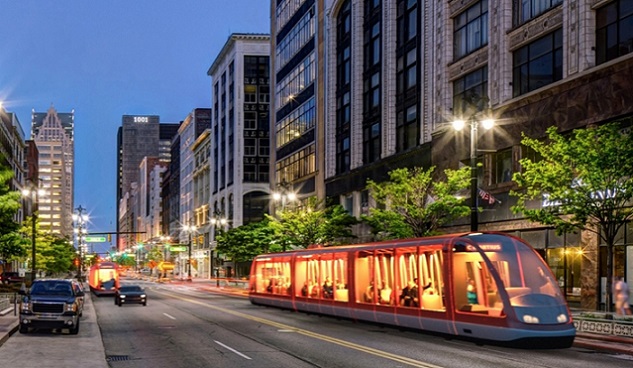 The QLINE, one of the many factors bringing change to Downtown Detroit, recently began operating.
The QLINE, one of the many factors bringing change to Downtown Detroit, recently began operating.
DETROIT—This city's downtown has been on the rise for a number of years, and high-tech firms and workers have played a key role. CBRE just released its latest Tech Talent Scorecard, part of its sixth-annual Scoring Tech Talent Report, and placed Detroit at #20 among the top 50 US and Canadian markets, the first time it broke into the elite group.
“It's finally a recognition of what's happening in Downtown Detroit,” Mark Collins, executive vice president with CBRE, tells GlobeSt.com. And the investment taking place downtown is not merely in the office space. All commercial real estate sectors in the CBD, including retail and multifamily, are showing increased momentum, with rising rental rates and values, along with steep falls in vacancy rates.
“I don't think Detroit is unusual in this respect,” Collins adds, as many Midwest CBDs have undergone similar transformations. But Detroit, which became the poster child of urban dysfunction, had a much longer road to travel back than most other US cities.
Tech workers increased steadily in Detroit from 2012-2017, experiencing a 24.6% expansion and now totaling 84,910, according to CBRE. “A key contributor to Detroit's increase in tech workers and rise in the rankings was the growth of its millennial population.” And “the population of millennials in their 20s grew by 14,119 (10.4%) since 2011. Detroit is the fourth-fastest growing large market for millennials.”
The auto industry continues to be an important driver of high-tech demand. Cars today utilize more high-tech features than ever before, and the top companies, including the many parts suppliers in the region, are expected to keep recruiting young, tech-savvy talent.
That recruitment will be made easier by the many top universities in the state, Collins adds. The University of Michigan at Ann Arbor, along with Michigan Technological University in Houghton, MI, in the Upper Peninsula, are both considered top performers. And today's tech graduates are less likely to move to Chicago, New York or the West Coast after graduation. “They're beginning to stay home, and the ones that left are beginning to come back.”
Between 2011 and 2016, Detroit each year added an average of 5,241 new tech graduates, according to CBRE. “This makes Detroit a top 10 market in the nation for tech degree completions.”
The top five markets for tech talent in 2018 were the San Francisco Bay Area, Seattle, Washington, DC, Toronto and New York, all large markets with a tech labor pool of more than 50,000.
© Touchpoint Markets, All Rights Reserved. Request academic re-use from www.copyright.com. All other uses, submit a request to [email protected]. For more inforrmation visit Asset & Logo Licensing.







